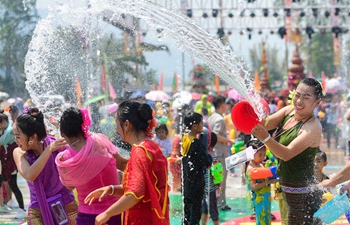SHENYANG, April 13 (Xinhua) -- Put on a veil, part with friends, walk into a quaint tavern, and embark on a three-hour hair-raising adventure in a 1910s Chinese town haunted by demons.
This is the latest immersive theater production "Mythic Stories of Fanling Township" staged in Shenyang, capital of northeast China's Liaoning Province.
Featuring a space of more than 3,000 square meters and over 30 well-designed rooms, the performance invites the audience to enjoy a number of spectacles at close range, such as a demon hunter fighting evil spirits in a bamboo forest and a priest exchanging souls with the demon in a laboratory.
More importantly, the audience can walk around freely in the venue, follow and even interact with any of the nearly 20 performers during the show, and then piece together their own plotline.
"It feels amazing when everything is unknown," said Ge Xinxin, a local theater-goer. "I don't know who the characters are, which character I should follow or how their stories will unfold."
Zhang Chunyang, producer of the play, said immersive theater has revolutionized the way the audience watch performances.
"Immersive theater allows the audience to enter the story from different perspectives and thus fully enjoy the show," Zhang said.
As experimental art, immersive theater has gained popularity in recent years among an increasingly sophisticated audience in Chinese cities, such as Shanghai, Nanjing and Hangzhou.
In Shanghai, one of China's most cosmopolitan cities, a total of 11 immersive or interactive theater productions were staged last year, including the award-winning "Sleep No More," a co-production between Britain's Punchdrunk International and China's SMG Live.
A commercial success in London, Boston and New York City, "Sleep No More" has become a theatrical sensation since its Asian premiere in Shanghai in 2016.
Still running in the McKinnon Hotel in downtown Shanghai, the immersive theater event has attracted more than 200,000 spectators, who yearn to participate in the art experience rather than view it from afar.
Based on Shakespeare's classic tragedy Macbeth, the Shanghai production of "Sleep No More" features a five-floor venue with over 90 cinematically detailed rooms, where the audience are allowed to open letters, sit on a sofa or drink water from a teacup.
"With the props and the changing music and smell, the play brought me a brand new experience," said Wei Ning, a Shanghai local. "I was so immersed in the show that I almost forgot about reality."
Wang Jinshan, deputy dean of the college of humanities at Inner Mongolia University of Finance and Economics, said the growing popularity of immersive theater in China shows that Chinese audiences' taste for theater arts has become more sophisticated and individualized in recent years.
"Immersive theater breaks the boundary between reality and art, and provides a fresh experience for the audience," Wang said. "As Chinese audiences get richer, their taste for art has become more diversified."

















